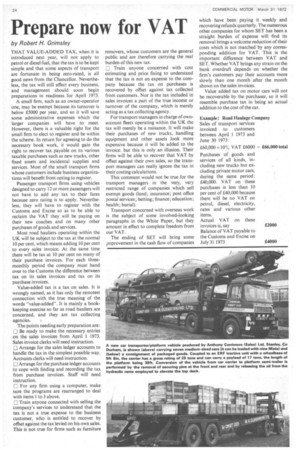Prepare now for VAT
Page 26

If you've noticed an error in this article please click here to report it so we can fix it.
by Robert H. Grimsley THAT VALUE-ADDED TAX, when it is introduced next year, will not apply to petrol or diesel fuel, that the tax is to be kept simple and that some aspects of transport are fortunate in being zero-rated, is all good news from the Chancellor. Nevertheless, the tax will still affect every business, and management should soon begin preparations in readiness for April 1973.
A small firm, such as an owner-operator one, may be exempt because its turnover is below £5000 per year, and so it will save some administrative expenses which the larger companies will have to meet. However, there is a valuable right for the small firm to elect to register and be within the scheme. In return for agreeing to do the necessary book work, it would gain the right to recover tax payable on its various taxable purchases such as new trucks, other fixed assets and incidental supplies and services. Most of the small transport firms whose customers include business organizations will benefit from opting to register.
Passenger transport firms using vehicles designed to carry 12 or more passengers will not have to add any tax to their fares because zero rating is to apply. Nevertheless, they will have to register with the Customs and Excise so as to be able to reclaim the VAT they will be paying on their new coaches and on many other purchases of goods and services.
Most road hauliers operating within the UK will be subject to the tax at the normal 10 per cent, which means adding 10 per cent to every sales invoice. At the same time there will be tax at 10 per cent on many of their purchase invoices. For each threemonthly period the company must hand over to the Customs the difference between tax on its sales invoices and tax on its purchase invoices.
Value-added tax is a tax on sales, It is wrongly named, as it has only the remotest connection with the true meaning of the words "value-added". It is mainly a bookkeeping exercise so far as road hauliers are concerned, and they are tax collecting agencies. t The points needing early preparation are: 0 Be ready to make the necessary entries on the sales invoices from April 1 1973. Sales invoice clerks will need instruction.
0 Arrange for the sales ledger accounts to handle the tax in the simplest possible way. Accounts clerks will need instruction.
0 Arrange for the purchase ledger accounts to cope with finding and recording the tax from purchase invoices. Staff will need instruction.
fl For any firm using a computer, make sure the programs are rearranged to deal with items 1 to 3 above.
fl Train anyone connected with selling the company's services to understand that the tax is not a true expense to the business customer, who is entitled to recover by offset against the tax levied on his own sales. This is not true for firms such as furniture
removers, whose customers are the general public and are therefore carrying the real burden of this new tax.
0 Train anyone concerned with cost estimating and price fixing to understand that the tax is not an expense to the company because the tax on purchases is recovered by offset against tax collected from customers. Nor is the tax included in sales invoices a part of the true income or turnover of the company, which is merely acting as a tax collecting agency.
For transport managers in charge of ownaccount fleets operating within the UK the tax will merely be a nuisance. It will make their purchases of new trucks, handling equipment and other assets look more expensive because it will be added to the invoice. but this is only an illusion. Their firms will be able to recover that VAT by offset against their own sales, so the transport managers can really ignore the tax in their costing calculations, This comment would not be true for the transport managers in the very, very restricted range of companies which sell exempt goods (land; insurance; post office postal services; betting; finance; education; health; burial).
Transport concerned with overseas work is the subject of some involved-looking paragraphs in the White Paper, but they amount in effect to complete freedom from our VAT.
The ending of SET will bring some improvement in the cash flow of companies which have been paying it weekly and recovering refunds quarterly. The numerous other companies for whom SET has been a straight burden of expense will find its removal brings a welcome reduction of their costs which is not matched by any corresponding addition for VAT. This is the important difference between VAT and SET. Whether VAT brings any strain on the bank overdraft depends on whether the firm's customers pay their accounts more slowly than one month after the month shown on the sales invoices.
Value added tax on motor cars will not be recoverable by the purchaser, so it will resemble purchase tax in being an actual addition to the cost of the car.
Example: Road Haulage Company Sales of transport services invoiced to customers between April 1 1973 and June 30 1973: £60,000 +10% VAT £6000 — £66,000 total Purchases of goods and services of all kinds, including new trucks but excluding private motor cars, during the same period: £40,000. VAT on these purchases is less than 10 per cent of £40,000 because there will be no VAT on petrol, diesel, electricity, rates• and various other items.
Actual VAT on these invoices is, say £2000 Balance of VAT payable to the Customs and Excise on
July 31 1973 14000




















































































